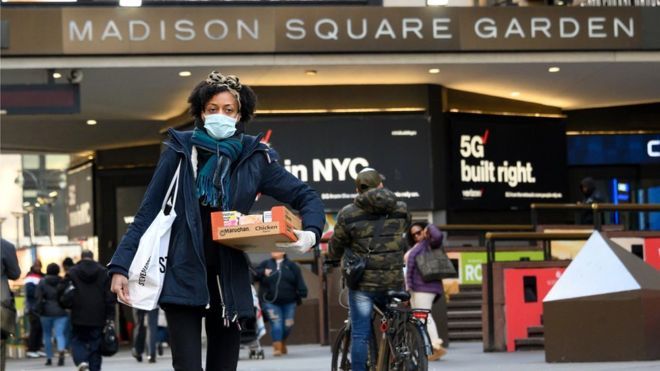 |
|
New York's Mayor Bill de Blasio may order the city's 8.5 million residents to "shelter in place" |
The deadly coronavirus has now hit all 50 states in the US as West Virginia reported its first case of the infection on Tuesday.
Announcing its first Covid-19 patient, West Virginia Governor Jim Justice said: "We knew this was coming."
New York City said it is considering a lockdown similar to one in the San Francisco Bay area.
There have so far been 108 deaths in the US from coronavirus and more than 6,300 confirmed cases nationwide.
Globally, there are about 200,000 cases and nearly 8,000 people have died.
As the Trump administration seeks a $1tn economic stimulus package, US Treasury Secretary Steven Mnuchin reportedly warned Republican senators privately on Tuesday evening that if Congress fails to act, US unemployment could hit 20% - almost double the jobless rate during the Great Recession.
What is New York City considering?
Mayor Bill de Blasio said he would decide within two days whether to order the city's 8.5 million residents to "shelter in place".
Such a move could largely confine people to their homes, while allowing them to make necessary trips to buy groceries or medicine, walk a dog or exercise as long as they avoid public interaction.
"It's a very, very difficult decision," Mr de Blasio said. "We've never been here before. I have never heard of anything like this in the history of New York City."
Officials in the San Francisco Bay area have already ordered 6.7 million residents to stay home for all but the most crucial outings until 7 April.
What role might the US military play?
US Vice-President Mike Pence said the White House may call on the US military to establish field hospitals in virus hot zones if requested by state governors.
He told a White House news conference on Tuesday that the Army Corps of Engineers could be asked to set up field hospitals, known as MASH (mobile army surgical hospital) units, or help expand existing hospitals.
Pentagon chief Mark Esper said the US military would make available five million respirator masks and up to 2,000 ventilators to the US health department.
He said the military would also open its 14 certified coronavirus testing labs to test non-military personnel.
What are the other latest US developments?
On Tuesday, Florida joined 11 other states in closing bars and restaurants in one of the most sedate St Patrick's Day celebrations the US has marked in peacetime.
Organisers of the Kentucky Derby - America's longest continuously held sports event - postponed the horse race until September.
It was the latest rite of spring to fall from the calendar because of the coronavirus, along with the Masters golf tournament, the March Madness basketball extravaganza and baseball season.
The country's largest enclosed shopping centre, the Mall of America in Minnesota, said it would close until the end of the month.
Los Angeles County sheriff's deputies were ordered to make fewer arrests to avoid jail crowding where the virus could spread.
Twenty-two people were reportedly infected with the respiratory illness at a nursing home in suburban Chicago.
Meanwhile, the US and Canada are finalising an agreement to suspend non-essential travel between the two countries and are expected to issue a statement in the coming days.
How is President Trump responding?
President Donald Trump - who is seeking re-election in November - told a press briefing on Tuesday afternoon that travel restrictions within the US were on the table.
"You can do a national lockdown," Mr Trump said. "Hopefully, we're not going to need that. It's a very big step."
He also defended his tweet on Monday calling the infection the "Chinese virus", which his critics said was racist.
"It did come from China," he told reporters.
Mr Trump also said on Tuesday of the outbreak: "I've felt that it was a pandemic long before it was called a pandemic."
Last month he struck a more optimistic tone, saying the US coronavirus outbreak "within a couple of days is going to be down to close to zero". BBC